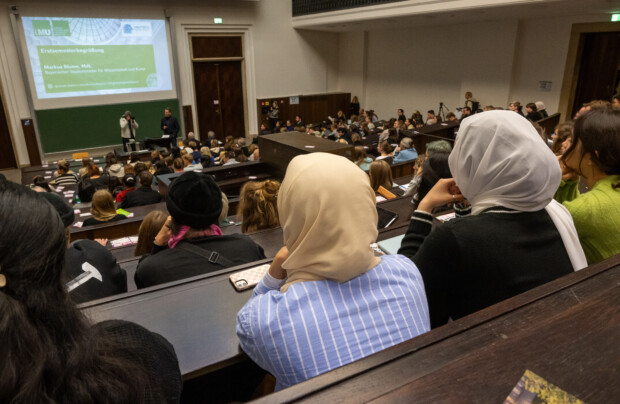
Islamists Recruiting and Expanding Across German Universities
The youth wing of the Furkan movement, which is under surveillance by Germany’s domestic intelligence service, has begun targeting first-year students in front of university campuses in an effort to win them over to its goal of creating an “Islamic civilisation.”
The group “Muslimstudents NRW”, a recruitment organisation linked to the Turkish Furkan movement, is banned from operating on university property. Nevertheless, its members have set up stands just outside campuses, on public walkways and bridges, under the slogan: “Information about Islam – information, dialogue and exchange.”
Two separate pavilions — one for men, one for women — were used to promote Islam to incoming students. The “Muslimstudents” organisation has also held recruitment activities at Ruhr University Bochum (RUB) and in Dortmund, where the Furkan movement’s headquarters are located.
„Muslimstudents NRW“ werben vor Ruhr-Uni für sich – Stände offenbar getrennt für Männer und Frauen https://t.co/wcGPblxFQu pic.twitter.com/rGtrZqu2da
— WELT (@welt) October 17, 2025
Islamist Networks Expanding on Campuses
The Islamists are advertising a three-year Islamic studies programme that teaches the Furkan movement’s ideology and methods. Since they have long been barred from officially operating within universities, the group often uses deceptive means to maintain a presence. Last year, for example, members registered themselves as a “book club” to set up their stands — an effort that was short-lived after university authorities intervened.
The Furkan movement rejects democracy and claims that Islam must govern every aspect of life — a worldview fundamentally incompatible with Germany’s liberal democratic order.
Troubling incidents of Islamist influence have increasingly appeared on German campuses. During an “Islam Week” held in May, male and female students were instructed to enter lecture halls through separate doors and to sit apart.
Even at the prestigious Charité University Hospital in Berlin, men and women were strictly segregated at semester-opening events. Similar gender segregation was observed at the University of Siegen, where the Muslim student association hosted events, and at Göttingen University, where men and women were separated during prayer gatherings.
Mit getrennten Pavillons für Männer und Frauen haben die „Muslimstudents NRW“ an der Uni Bochum erneut für Aufsehen gesorgt. Offiziell geht es um „Aufklärung über den Islam“, tatsächlich um ideologische Missionierung. https://t.co/OijGJK6t0T Die Gruppe steht der türkischen…
— Tichys Einblick (@TichysEinblick) October 17, 2025
Germany’s Troubling Future: Half of Young Muslims Demand an Islamic State
Today, roughly 5.6 million Muslims live in Germany — about 6.5 per cent of the population. If current immigration trends continue, the Pew Research Center estimates that by 2050, Muslims could make up 20 per cent of Germany’s population. At the same time, radicalisation among young Muslims is on the rise, especially among those under 15 years old. In 2014, Muslims made up 8–10 per cent of this age group; by 2024, that share had risen to 11–12 per cent, and within fifty years — a short period by historical standards — reliable estimates suggest it could reach 30 per cent.
From Parallel Societies to Majority Societies?
Experts warn that this trend is already visible in cities such as Offenbach, Duisburg (Marxloh, Rheinhausen), Essen (Katernberg) and Gelsenkirchen (Buer, Resse), where the proportion of Muslim youth already exceeds 30 per cent. Problems in nurseries and schools remain unresolved, and integration — which has failed both in homes and classrooms — is unlikely to occur later in life.
As a result, parallel societies are steadily transforming into majority societies, whose tolerance towards people of other faiths is far lower than the reverse. A recent KFN study found that 67.8 per cent of Muslim students agreed with the statement: “The rules of the Qur’an are more important than German law.” In other words, religious norms (similar to Sharia) is seen as superior to civil law. Even more striking, 45.8 per cent of respondents said they consider an Islamic theocratic state to be the best form of government.

